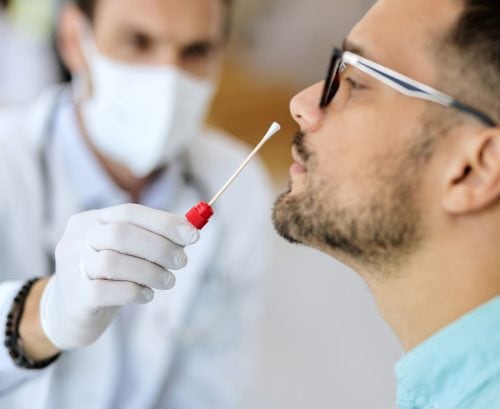
COVID outbreaks have been on the rise in several countries recently, putting a more transmissible variant of the SARS-CoV-2 virus called Delta in the spotlight.
The Delta variant, which has infected millions globally, was first identified in India late December last year and was responsible for several outbreaks there. It has since become the predominant form of coronavirus in the UK, US, Germany, Australia and other countries, and has been detected in more than 80 countries worldwide.
Variant of concern
The World Health Organization (WHO) has identified Delta as the fourth ‘Variant of Concern’ (VOC) since the start of the pandemic, meaning it poses greater potential risk to global health than variants without that characterisation. This is because Delta is more transmissible and has been able to resist antibodies.
WHO chief scientist Soumya Swaminathan says people need higher levels of antibodies in their blood to overcome Delta than previous VOCs such as Alpha.
Delta and vaccination
A recent study found the Delta variant was better at escaping neutralisation from partial vaccination or previous infection, meaning a second vaccine dose is vital for the best protection. Both the AstraZeneca and Pfizer vaccines are given in two doses.
But Dr Soumya says even partial vaccination will still effectively reduce the risk of severe disease and hospitalisation.
“What we need to do in the world today is to break those chains of transmission, get a control on this disease. So that’s why we say get vaccinated as soon as you can get access to your vaccine, when your turn comes, and continue to take all the precautions so that you are completely protecting yourself as well as protecting others around you,” she says.
How to stay safe
The WHO urges even fully vaccinated people to continue physical distancing and wearing masks or face coverings and to take the same precautions you would if you had no COVID-19 antibodies.
So, keep up the hand, sneeze and cough hygiene, mask wearing, isolating and getting tested if you are unwell, and continue contact tracing practices.
Do Delta symptoms differ from other COVID infections?
The most common symptoms coming out of the UK, where Delta is dominant include:
1. Headache
2. Sore throat
3. Runny nose
4. Fever
5. Persistent cough
According to a feature in The Conversation, ‘runny nose’ was rarely reported previously, while ‘loss of smell’, which is usually quite common, appears to be a less reported symptom with Delta variant infection.
Article sources and references
- Planas, D., Veyer, D., Baidaliuk, A. et al. Reduced sensitivity of SARS-CoV-2 variant Delta to antibody neutralization. Nature (2021). https://doi.org/10.1038/s41586-021-03777-9https://www.nature.com/articles/s41586-021-03777-9
- Scimex, 9 July 2021. Get your booster: The Delta variant could dodge partial protection. Accessed July 2021https://www.scimex.org/newsfeed/get-your-booster-the-delta-variant-could-dodge-partial-protection
- World Health Organization. Tracking SARS-CoV-2 variants. Accessed July 2021https://www.who.int/en/activities/tracking-SARS-CoV-2-variants/
- World Health Organization, 1 July 2021. Episode #44 - Delta variant and vaccines Transcripthttps://www.who.int/emergencies/diseases/novel-coronavirus-2019/media-resources/science-in-5/episode-44---delta-variant-and-vaccines
- The Conversation, 1 July 2021. The symptoms of the Delta variant appear to differ from traditional COVID symptoms. Here’s what to look out for. Accessed July 2021https://theconversation.com/the-symptoms-of-the-delta-variant-appear-to-differ-from-traditional-covid-symptoms-heres-what-to-look-out-for-163487
www.healthyfood.com










